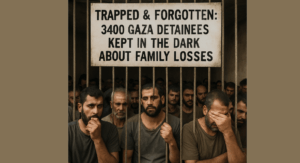Trapped & Forgotten: 3400 Gaza Detainees Kept in the Dark About Family Losses
For over a year, Ahmed Wael Dababish longed to reunite with his wife and children, unaware that an Israeli airstrike had killed his wife, Asma, and their three-year-old daughter, Ghina. Detained without charges for 13 months, he had no access to a lawyer or any contact with the outside world. When he was finally released in February 2025, his initial joy turned to devastation upon learning of his family’s fate. His father showed him a heartbreaking photo of Ghina’s burial, a moment he still struggles to accept.
Dababish’s story is not unique—thousands of Palestinian civilians have been imprisoned under Israel’s “unlawful combatants” law, which allows indefinite detention without evidence or trial. With no communication permitted, many detainees remain unaware of the tragedies that have befallen their families. Human rights groups argue that these prolonged detentions and extreme isolation violate international law, despite Israel’s claims of compliance. Now homeless and living in a temporary shelter, Dababish is trying to rebuild his life, holding onto the hope of returning to work as a nurse.\

Trapped & Forgotten: 3400 Gaza Detainees Kept in the Dark About Family Losses
For more than a year, Ahmed Wael Dababish held onto the hope of reuniting with his wife and children. A nurse from Gaza, he last saw them in December 2023 when Israeli forces raided the school where they had sought refuge. That night, soldiers separated the men from their families, and Dababish was taken away.
For 13 months, he remained in detention without charges, a trial, or any contact with the outside world. In August 2024, when an Israeli airstrike killed his wife, Asma, and their three-year-old daughter, Ghina, there was no way for him to know.
His release finally came in February 2025 as part of a ceasefire agreement. When he stepped out, his father and cousins were there to welcome him. But his relief quickly turned to heartbreak when he asked about his wife and children. His father handed him a photograph of Ghina, lying beside her cousin before burial. Tears streamed down his face. “I still can’t believe it,” he murmured. His two surviving children, six-year-old Muadh and eight-year-old Aisha, wrapped their arms around him, trying to comfort their grieving father.
Dababish’s story is just one of many. Numerous Palestinian civilians from Gaza were detained without trial, only to be released and discover that their families had been killed while they were imprisoned. Among them were a civil servant and a school principal—ordinary people who had no access to lawyers or any way to reach their loved ones.
Legal organizations estimate that thousands of detainees are still unaware of what happened to their families. Since October 7, 2023, Israel has banned phone calls, letters, and visits for Palestinian prisoners. Televisions and radios have been removed from their cells, leaving them completely cut off. “They don’t want them to know anything about their families,” said Tala Nasir from Addameer, a Palestinian prisoners’ rights group.
Most detainees are held under Israel’s “unlawful combatants” law, which allows indefinite imprisonment without the need to present evidence. Following legal challenges, Israel admitted that by December 2024, over 3,400 Palestinians from Gaza were being held under this law. Some were freed during a temporary ceasefire, but thousands remain behind bars.
Among them was Ibrahim Dawood, a civil servant who was released under the ceasefire agreement. He described how he was repeatedly beaten whenever he asked for a chance to prove his innocence. Without legal representation, he had no idea what had happened to his family. When he finally returned home, he learned that an Israeli airstrike had demolished his house, killing his father, sister, sister-in-law, and three young relatives. A video capturing the moment he collapsed in grief was widely shared online, highlighting the silent suffering of many former detainees.
The Israeli military has refused to disclose how many Palestinians from Gaza remain in detention or how many have been allowed to meet with lawyers. While officials claim they follow national and international laws, human rights groups argue that prolonged isolation and the lack of legal representation violate international standards.
For Dababish, freedom has come at an unbearable cost. His home is gone, and he now lives in a school-turned-shelter with his parents and surviving children. Schools—once places of safety—became sites of devastation for his family. Despite the unimaginable loss, he is trying to rebuild his life. As a nurse, he hopes to return to work and provide for his children, though the pain of his loss lingers. For now, his focus is on survival, finding a way forward from the ruins of his past.
You must be logged in to post a comment.